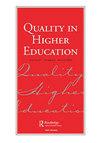南高加索地区高等教育的质量保证
IF 1.5
Q3 EDUCATION & EDUCATIONAL RESEARCH
引用次数: 0
摘要
本期专题深入探讨南高加索国家阿塞拜疆、亚美尼亚和格鲁吉亚作为不同的主权国家,有着各自独特的文化和意识形态,但在地缘政治上却有着共同之处,即最近苏联占领了格鲁吉亚20%的领土。他们都希望发展、现代化和运营一个有效的高等教育体系,通过创造力、独创性和想象力来支持他们的教育、文化和经济抱负。为此,它们都在2005年卑尔根部长级会议上加入了博洛尼亚进程,并对其后殖民时期的未来进行了改革,旨在提高本国高等教育的质量,为学生和学者的流动提供机会,改善教学和学习制度,创建质量保证工具,为内部和外部质量评估和认证提供方向和重点,并开始注重其研究基础设施。作为欧洲高等教育区(EHEA)的成员,每个国家都必须解决自己的高等教育部门,以便正式遵守协议的要求,这迫切需要负责方案或机构认证的独立质量保证机构。每种情况的后果各不相同,每种情况如何应对的细节无法在本期特刊的论文选集中完全涵盖。所取得的成就反映了南高加索地区如何满足EHEA成员资格的要求。它是讨论该地区高等教育未来方向的催化剂,包括进一步大规模改变国家系统,将私立机构与国家支持的学院一起纳入其中。本期特刊的每篇文章都对国家一级的进展进行了评论,反映了战略系统一级或机构战术一级的行动。这些文章来自2021年在第比利斯举行的高等教育会议之后的讨论,该会议由东欧和第比利斯国立大学联合组织。每篇论文在三个标题下进行介绍和背景说明:本文章由计算机程序翻译,如有差异,请以英文原文为准。
Quality assurance of higher education in the South Caucasus
This issue offers insights into how the south Caucasus countries of Azerbaijan, Armenia and Georgia as different sovereign nations with their distinctive cultures and ideologies share a geo-political commonality of recent Soviet occupation with 20% of Georgia territory under occupation. They share a desire to develop, modernise and operate an effective higher education system which, through creativity, ingenuity and imagination supports their educational, cultural and economic ambitions. To that end they all joined the Bologna Process at the Bergen Ministerial Conference in 2005 and have undertaken reforms of their post-colonial futures, intended to improve the quality of higher education within their country and provide opportunities for students and academics’ mobility, improvement in teaching and learning r egimes, the creation of quality assurance instruments that provide direction and focus to internal and external quality assessments and accreditation and have begun to focus on their research infrastructures. As members of the European Higher Education Area (EHEA), each country has had to address its own higher education sector in order to formally comply with the agreement necessities, which critically required independent quality assurance bodies that had responsibility for programme or institutional accreditation. The consequences for each are different and details of how each has responded cannot be fully covered in this selection of papers in this special issue. What has been achieved, is a representation of responses that shine a light on the way the South Caucasus has answered the requirements for EHEA membership. It acts as a catalyst to discussion on the future direction of higher education in the region, including the furthering of large-scale alteration of national systems to include private institutions alongside nation-supported academies. Each of the articles in this special issue offers comments upon progress at a country level, reflecting action at either the strategic systematic level or at the institutional tactical levels. The articles emerged from a discussion following a conference on higher education held in Tbilisi in 2021, organised jointly by the East European and Tbilisi State universities. Each paper is introduced and contextualised under three headings:
求助全文
通过发布文献求助,成功后即可免费获取论文全文。
去求助
来源期刊

Quality in Higher Education
EDUCATION & EDUCATIONAL RESEARCH-
CiteScore
3.30
自引率
14.30%
发文量
32
期刊介绍:
Quality in Higher Education is aimed at those interested in the theory, practice and policies relating to the control, management and improvement of quality in higher education. The journal is receptive to critical, phenomenological as well as positivistic studies. The journal would like to publish more studies that use hermeneutic, semiotic, ethnographic or dialectical research as well as the more traditional studies based on quantitative surveys and in-depth interviews and focus groups. Papers that have empirical research content are particularly welcome. The editor especially wishes to encourage papers on: reported research results, especially where these assess the impact of quality assurance systems, procedures and methodologies; theoretical analyses of quality and quality initiatives in higher education; comparative evaluation and international aspects of practice and policy with a view to identifying transportable methods, systems and good practice; quality assurance and standards monitoring of transnational higher education; the nature and impact and student feedback; improvements in learning and teaching that impact on quality and standards; links between quality assurance and employability; evaluations of the impact of quality procedures at national level, backed up by research evidence.
 求助内容:
求助内容: 应助结果提醒方式:
应助结果提醒方式:


